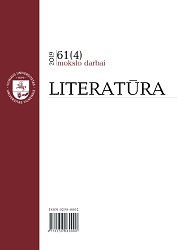L’Histoire et l’identité selon Leïla Sebbar
History and Identity according to Leïla Sebbar
Author(s): Małgorzata KameckaSubject(s): Social history, Novel, French Literature, Culture and social structure , Sociology of Culture, Identity of Collectives
Published by: Vilniaus Universiteto Leidykla
Keywords: identity; memory; mixed culture; History; Algeria; war for Independence;
Summary/Abstract: Leila Sebbar, since the beginning of her literary work, has been describing her identity experience connected with her mixed family origins: the writer’s father was Algerian and her mother French. This prevailing thread in her texts demonstrates the weight of the (re)construction of identity, frequently incoherent and delicate, in order to confirm her ethnic and cultural affinity. The author of this article is interested in problems, so close to the writer, of identity and history. The point of departure of the reflection on Sebbar’s attitude towards mother tongues of her parents is the analysis of her autobiographical novel “Je ne parle pas la langue de mon père” (2003). “We are not born with one identity, an identity is always gained, built”, maintains Sebbar and through this statement she confirms the role of the cultural baggage in the broad sense of the word, in the life of an individual coming from a culturally diversified environment. The questions of the ignorance of the Arabic language also lead the writer to define not only the picture of the individual family history but also common history, the history of the inhabitants of Algeria during the French colonization. The Seine Was Red: Paris, October 1961 (1999) is a story in which its author continues to exploit, tirelessly, the issue related to the history of its two countries: Algeria and France. For Leïla Sebbar, to return to the traumatic events of the massacre of dozens of Algerians in Paris on October 17, 1961 means to enter into incessant dialogue with the painful past. It seems that the writer’s will to confront the past is one of characteristic qualities of her works. In an original, far from stereotypical, way she tries to disclose errors and fights the oblivion and repression of uncomfortable events from history. The aim of the article is to analyze the non-stereotyped strategies that Sebbar uses to build his characters and to reflect on the modes of representations of History and identity.
Journal: Literatūra
- Issue Year: 61/2019
- Issue No: 4
- Page Range: 54-66
- Page Count: 13
- Language: French

